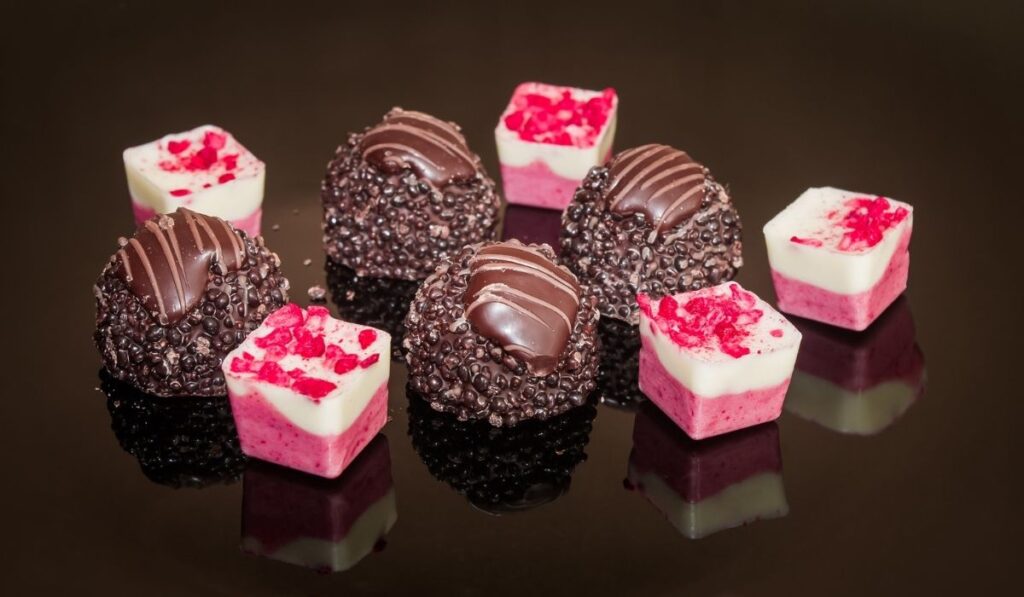Chocolate always seems to find a way into our lives, whether it’s to celebrate a special occasion or just as a snack to help us get through the day. But is this tasty treat good for your teeth, or will it contribute to decay and other oral hygiene issues?
Consuming dark chocolate in moderation (a few times a week) is safe for your teeth. In fact, the antioxidants present in cocoa can have positive affects, such as helping fight cavities, preventing bad breath, and reducing the risk of heart disease. Milk chocolate has fewer benefits.
Milk and white chocolates usually contain a high amount of milk and sugar, which can damage your tooth enamel and lead to the production of acid. But dark chocolate contains much less milk and sugar, making it safe to consume, as long as it’s done in moderation. Read on to learn why dark chocolate is the safest option for chocolate lovers.
What Negative Effects does Dark Chocolate Have on Teeth?

When consumed in moderation, dark chocolate isn’t bad for your teeth; in fact, it has even been shown to have some properties that fight cavities and slow tooth decay. Darker chocolates contain the least amount of sugar and milk, making it less damaging to your teeth’s enamel.
These factors also make dark chocolate the healthiest type of chocolate, at least when compared to milk or white chocolate. However, with that said, it should only be consumed in moderation in order to prevent tooth decay.
Practicing oral hygiene such as brushing your teeth, using mouthwash, and flossing are among the best and most effective methods of keeping your mouth in tip-top shape.
Is Dark Chocolate Good For Your Teeth?
If you’re a fan of dark chocolate, we’ve got some good news. Dark chocolate can indeed be good for your teeth, since it’s loaded with antioxidants that help fight against cavities and can even reduce the risk of heart disease.
Dark chocolate also contains polyphenols, which are chemicals that help fight the growth of bacteria that can damage the enamel of your teeth. Furthermore, polyphenols can also neutralize the organisms that end up causing bad breath while also preventing some sugars from turning into acid.
The benefits of dark chocolate don’t quite end there; dark chocolates also contain flavonoids that work to slow tooth decay.
The composition of dark chocolate is usually 70% cocoa and 30% other ingredients (milk, sugar, etc.), which means that the harmful effects that come from other kinds of chocolate are reduced. Some dark chocolates, like this Lindt Excellence Bar (on Amazon), have an even higher cocoa content.
However, even with all the benefits that dark chocolate offers, it shouldn’t be consumed in excessive amounts. An high intake of dark chocolate can still deteriorate the enamel and cause cavities.
The best time to have a piece of dark chocolate is at the end of a meal, so that it can help neutralize your oral pH levels and protect your teeth from plaque. Rather than snacking on chocolate throughout the day, it’s best to time this treat with the end of a meal to get the full benefits.
Are Milk and Dark Chocolate Both Good for Your Teeth?

Not all types of chocolates are created equal. While dark chocolate has an array of health benefits, the same can not be said about milk chocolate unfortunately.
Milk chocolate is indeed far more popular than dark, but it’s not good for your teeth. That’s because the sugar content in milk chocolate is much higher than in dark chocolate.
The composition of milk chocolate is usually only 20-30% cocoa. The rest of milk chocolate is made up of sugar and milk. The higher sugar levels can cause cavities, deteriorate the enamel, and cause other oral hygiene problems.
The high sugar content in milk chocolate reacts with the bacteria in your mouth to form acid, which then breaks down and deteriorates your tooth’s enamel. Meanwhile, the much lower sugar content in dark chocolate essentially helps decrease the bacteria reaction and the formation of damaging acid.
Can Dark Chocolate Cause Tooth Decay?
As we mentioned earlier, moderate consumption of dark chocolate can actually help fight and slow down tooth decay. The high concentration of cocoa in dark chocolate helps fight off bacteria, which is the main cause of tooth decay and cavities.
Furthermore, dark chocolate also helps increase blood flow, lower blood pressure, and lower the risk of heart disease. It does this by raising your HDL, which is your good cholesterol, and lowering your LDL, which is the bad cholesterol.
However, don’t forget that the benefits of dark chocolate are only present if it’s consumed in moderation. A significant intake of dark chocolate will not only stop the benefits but also cause harm to your oral hygiene and teeth enamel.
Therefore, consuming dark chocolate a few times a week is considered acceptable, but refrain from everyday consumption.


